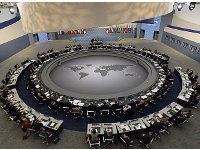World economy slows down
The meeting of finance ministers and central bank representatives of the G-20 in Mexico discussed the likely slowdown in the global economy and measures to stimulate the economic activity. The next meeting will be held under the Russian presidency. A priority at the next meeting will be the adoption of a new formula for the distribution of IMF quotas and the growing share of China at the fund.

"The tempo of the global economic development continues to remain quite low, while potential risks remain high," the statement said. Representatives of the central banks of 20 countries believe that the risk is based on the potential for the debt crisis in the euro zone to expand.
The budget problems of the United States pose a serious risk for the financial sector. The slowdown in the economies of many developing countries, particularly China, also plays a negative role. According to the International Monetary Fund, the global economy will grow by 3.3 percent this year and by 3.6 percent next year. Representatives of the Group of Twenty are going to deal with all these problems next year.
In addition, at the initiative of Germany and the UK, there will be a possibility considered for the introduction of a single tax standard on corporate income. It is assumed that the flat tax would reduce the movement of capital and enable national authorities to deal with the budget deficit better.
According to Tax Justice Network, as much as 1.1-1.6 trillion dollars are diverted from taxation in the world every year, which reduces tax revenues by $250 billion. To stimulate economic growth, G20 recommended budget spending should be increased for budget surplus countries, with raised protests in Russia and China. According to the IMF, China's GDP this year will grow by 7.8 percent. The Russian economy is expected to grow by 3.7 percent.
According to Russia's Finance Minister Anton Siluanov, it is too early to mitigate fiscal policy to stimulate the growth of the global economy. The minister also reminded that the Russian government had approved the budget rule to limit the spending. As for the next meeting, which will be held under the Russian chairmanship, Russian officials announced the plans to revise the quotas in the International Monetary Fund.
Russia's quota in the capital of the IMF currently makes up 2.5 percent. Thу quota of China is expected to become the third largest in the total capital of the IMF after the quota of the U.S., which now stands at 17.7 percent, and Japan, whose quota makes up 6.5 percent. The Chinese should make the Germans move: Germany is the third largest holder of the IMF share (6.1 percent). China's current quota is 4 percent. Each quota implies "the basic" component, which is calculated by dividing the amount of about 5 percent of the IMF by the number of participating countries. The allocated quota determines the amount of money that is supposed to be invested in the fund's capital. Every 160,000 gives an extra vote, but it is impossible to simply buy the missing votes. This can be done only through a quota, the formula of which is determined by the Americans.
Today, the formula includes four indexes that are alchemically mixed in certain proportions. The formula takes into account the weighted average of GDP (50 percent in the formula), openness (30 percent), economic variability (15 percent) and international reserves (5 percent). GDP is calculated at market exchange rates (60 percent in the definition of GDP) and 40 percent on the base of exchange rates at purchasing power parity. Most likely, the hardly verifiable indicator of variability will disappear from the formula. Discussions are to be finished next year.
Anatoly Miranovsky
Pravda.Ru
Subscribe to Pravda.Ru Telegram channel, Facebook, RSS!





